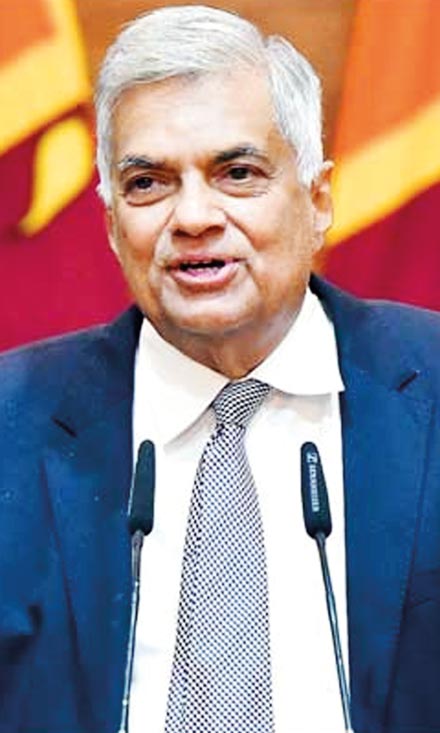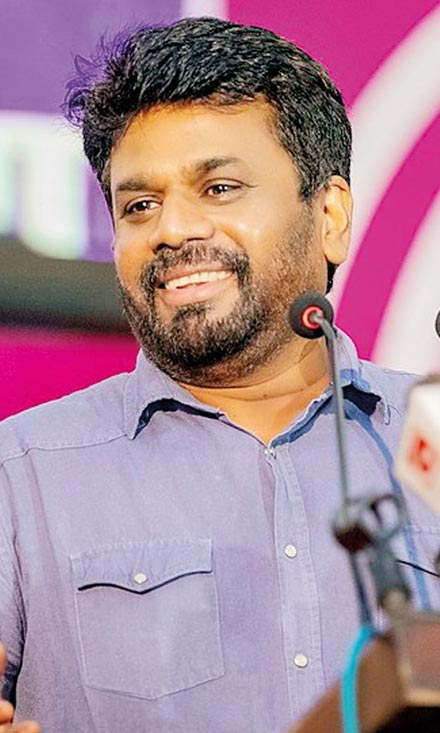Monday Feb 16, 2026
Monday Feb 16, 2026
Friday, 21 June 2024 02:25 - - {{hitsCtrl.values.hits}}

President Ranil Wickremesinghe

NPP Leader Anura Kumara Dissanayake
 RW’s Economic Transformation Bill (ETB) passed in Parliament aims to reach an economic growth target of 5% by 2027 and 8% thereafter for 15 years. ETB has been hailed as an ambitious yet achievable agenda for promoting sustainable development, enhancing productivity, social progress, and creating equal opportunities for all citizens. These objectives are expected to be achieved through a series of institutions such as the Economic Commission of Sri Lanka, Investment Zones, Office of International Trade, National Productivity Commission, and Sri Lanka Institute of Economics and Trade.
RW’s Economic Transformation Bill (ETB) passed in Parliament aims to reach an economic growth target of 5% by 2027 and 8% thereafter for 15 years. ETB has been hailed as an ambitious yet achievable agenda for promoting sustainable development, enhancing productivity, social progress, and creating equal opportunities for all citizens. These objectives are expected to be achieved through a series of institutions such as the Economic Commission of Sri Lanka, Investment Zones, Office of International Trade, National Productivity Commission, and Sri Lanka Institute of Economics and Trade.
These structures replacing the all-in-one Board of Investment of 1978 is more a paraphernalia to decorate the institutional landscape of the economy than to produce any tangible outcome. However, unlike RW’s earlier target of transforming the economy into an export paradise by 2048, ETB has somewhat modified his target to achieve just a respectable growth rate of 8% following the footsteps of China, Singapore, Vietnam, Thailand and Bangladesh. But, once again the error is in isolating the economy from the poly-crisis and hoping that economic growth alone would be the panacea for all other crises. In reality, the economic crisis is only a symptom – though a serious one – of a malignant cancer killing the entire system. The solution therefore needs the removal of the system itself.
As one writer poignantly commented, ETB attempts to provide “imaginary solutions to real problems”, and according to another, it as an attempt to set up an “economic constitution within a constitution” to lock the IMF path of economic reforms unchangeable by any future government. In essence, this Bill, introduced just a few months before an election supposed to be held on 5 October according to one minister, is another politically motivated instrument to prevent system change. It is a propaganda tool for RW to frighten the voting public that the call for system change by NPP is a direct threat to economic transformation, which according to his colleagues is already under way.
But Verite Research after analysing the 2023 Budget proposals has pointed out that the Government’s information disclosure regarding fiscal consolidation is at an all-time low. Does this mean that the real picture of the transformation is being camouflaged by statistical massaging of reality? Yet, and in spite of concealed facts, Sri Lanka has been admitted as a member of the United Nations Economic and Social Council (ECOSOC) for a three-year term. This is not surprising under IMF direction. For whatever it’s worth RW may claim credit for that membership and even advertise it as evidence of the transformation.
But the reality is otherwise. In a system built on a culture of corruption, nepotism, discrimination and legal impunity, of what use are institutions and imaginary visions? The institutions proposed under ETB would be filled by the same cadre of managers, lawyers and accountants schooled in the same system that turned the SOEs into lossmaking white elephants. As long as corrupt management culture and the system that promotes it remain unchanged no economic transformation could be sustained. For instance, how could sustainable development, productivity, social progress and equal opportunity for all be guaranteed when the ruling political culture advocates open discrimination against ethnic minorities, sacrifices merit in the interest of ethnic majoritarian politics, rewards the corrupt and kleptocrats with legal impunity for their economic crimes? How could the economy deliver economic justice when mafiosi are allowed to rule the market? How could economic development be funded without falling into more debt when the moneyed class is allowed to evade paying its share of the cost burden? Why is IMF reluctant to introduce a wealth tax targeting this class instead of a property tax affecting every householder? No wonder Sri Lanka’s debt sustainability is at knife’s edge. Funding sustainable development and economic transformation with borrowed money and without system change is to take one step forward and two steps backward. The system of governance requires radical transformation before targeting growth rates.
NPP’s commitment
Post-Aragalaya NPP representing the aspirations of a new generation of voters across the nation is the only political entity committed to the transformation of the system itself. NPP’s call for a radical transformation of the country’s political culture through a social revolution captures that goal. Unlike the urban centred leftist movement of previous decades NPP is heavily rural centred with urban support. It is also penetrating into the vote banks of minorities who had been traditionally conservative in their voting behaviour. All this means that NPP is seen as a mortal threat to the interests of the country’s geriatric leaders. That explains the endless media propaganda and scare mongering about the insurrectionary past of JVP and its leader AKD.
It now appears that a loophole in the constitution may allow RW to continue in his position for another 12 months at least, although he claims not to go against the democratic socialist principles, whatever that means. There is also a general feeling within the local officialdom, foreign interests and the moneyed class that he is the man for the season. But more than that and importantly, those political leaders who still sit in parliament and whose corrupt past is destined to bite them when the system is transformed under NPP would have no alternative but to rally behind RW to save their skin. That explains why he is trying hard to contest as an independent candidate so that he could garner the votes from all quarters. When the time approaches SJB may not even enter the presidential contest, which means the final lap would be a race between AKD and RW.
NPP and 13th Amendment
NPP is not a Sinhala racist party as its opponents are trying to portray, but a national power representing all communities. It has been criticised by certain Tamil factions for not promising to implement the 13th Amendment to devolve powers, as SJB and RW had done. On the contrary, NPP is promising to go beyond that Amendment. It is worth looking at the logic and rationale behind this promise. Historically, the demand for Federalism, the Eelam War, the 13th Amendment, and in a sense even the Muslim political parties were all reactions to an ethnonational political model erected on the edifice of Sinhala Buddhist majoritarianism. If that model could be replaced by secular democracy guaranteed by a constitution that ensures the same rights and obligations to every citizen irrespective of that citizen’s ethnicity, religion, caste or culture, as Singapore has done, and protects the cultural pluralism of the country, why the need for 13th Amendment?
It is this logic that lies behind NPP’s promise to go beyond that Amendment, and the party’s resolve to look to the future and not the past. The commitment for system change cannot exclude this political necessity. RW’s promise of ethnic reconciliation is impossible within the current political model and any party promising to implement the 13th Amendment can do so only at the peril of creating another cycle of communal mayhem. System change is a national and generational necessity and without that neither the economy nor the society can expect sustainable development with communal harmony.
Turning point
After more than 75 years experimentation with Sinhala Buddhist majoritarianism in the name of parliamentary democracy the country is witnessing the stark reality of the damage that experiment had done economically, politically, socially and internationally. The nation is at a turning point. The forthcoming election whether Presidential or General presents a hard choice between the continuation of the old but moribund and destructive socio-political majoritarian system, and a new system founded on secular democracy and cultural pluralism and with a constitution guaranteeing equal rights for all, economic justice and rule of law. NPP represents that systemic transformation.
(The writer is attached to Business School, Murdoch University, W. Australia.)